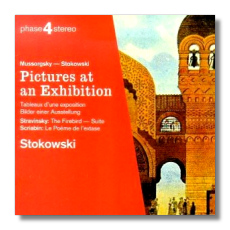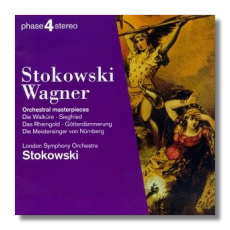
The Internet's Premier Classical Music Source
Related Links
- Latest Reviews
- More Reviews
-
By Composer
-
Collections
DVD & Blu-ray
Books
Concert Reviews
Articles/Interviews
Software
Audio
Search Amazon
Recommended Links
Site News
 CD Review
CD Review
Stokowski & Phase Four

- Modest Mussorgsky/Stokowski: Night on the Bare Mountain (1967)
- Alexander Borodin: Polovtsian Dance (1969) *
- Modest Mussorgsky/Stokowski: Boris Godunov - Symphonic Synthesis (1968) **
- Piotr Ilyitch Tchaikovsky:
- 1812 Overture (1969) *
- March Slave (1967)
London Symphony Orchestra
* Royal Philharmonic Orchestra
** L'Orchestre de la Suisse Romande
London "Phase Four" 443896-2


- Modest Mussorgsky/Stokowski: Pictures at an Exhibition (1966)
- Alexander Scriabin: Le Poem de l'extase (1975)
- Igor Stravinsky:
- Pastorale (1969)
- The Firebird: Suite (1967)
New Philharmonia Orchestra
Czech Philharmonic Orchestra
Royal Philharmonic Orchestra
London Symphony Orchestra
London "Phase Four" 443898-2


- Richard Wagner:
- Ride of the Valkyries, Dawn & Siegfried's Rhine Journey, Siegfried's Death & Funeral Music, Entrance of the Gods into Valhalla, Forest Murmurs (1966)
- Die Meistersinger: Prélude (1973)
London Symphony Orchestra
London "Phase Four" 443901-2
Most of this material has been previously issued. It first appeared from Japan, licensed from Decca and issued on the King label. Those discs were available only in Japan but a few found their way over to me. Those remasterings were superior to the Weekend Classics series issued in this country. That issue of the Wagner music was particularly unflattering. Still, half a loaf and all that. London did issue the Debussy La Mer on a medium priced disc and Schéhérazade on another (both with other couplings). Those sounded better than the Weak end Classics, but the latter was really coarse. Still the Schéhérazade was better than a remastered issue available in a 4-disc box set from the Lincoln Center that made the performance actually sound dull.
All this by way of putting these discs into a perspective. I am going to help those of you who choose to scan articles by letting you read the last line now. If you have been disappointed in the past, that time is gone. If you want to wallow in beautiful music, especially Wagner, snap these up. Now back to the reviews. I have listened to all of these discs, the Wagner several times. These recordings sound better than the LPs and involve you completely in Stokowski's Sound. Another thing the engineers have done is to keep the tape rolling at the end of each piece. This adds a few seconds to each track, but also adds more of the music as it fades (while not exclusively his, this was a Stokowski trademark and part of his sound). In fact, there is more air around all the sound now, not like the cheaper, earlier releases.
Stokowski once said that one day it would be possible to make recordings that are better than live performances. He was intimately involved in the recording process from the days of acoustic 78s up to late stereo (he just missed the digital age). Listening to these discs you can now hear why Stokowski was excited by the whole Phase Four technique. While earlier releases are stereo, these are more. I have spent a lot of time re-listening to these discs, especially the Wagner.
I once asked Sylvan Levin if he thought that Stokowski had any regrets. Sylvan didn't hesitate to say that he thought Stokowski wished he had the chance to do more opera. Listening to this disc of excerpts from the Ring makes me wish he had done a cycle. Unfortunately that is not to be, but this disc gives an idea just what we might have had. This is Technicolor Wagner. Every emotion is wound tight as a drum and let loose in a torrent. The Ride swirls you along, the Forest Murmurs are haunting. The Meistersinger Prélude is not from the studio sessions that are on the rest of the disc. It was taken from a live concert celebrating Stokowski's 60th Anniversary Concert with the London Symphony in 1973. It, along with the rest of the program, was part of his original London Symphony concert. (Might we hope for a release of all of those items, too? Could the cover include the wonderful portrait of Stokowski that was featured on the LP?) Stokowski has an effect with the melody that I have never heard before or since. That phrase seems to pass around the orchestra, swirling and singing. That I am certain is a result of Stokowski's sense of relief in the orchestra, and not a gimmick in the studio (it was live).
Now I turn to the Pictures disc. I have long argued that Stokowski's transcription is not necessarily better than Ravel's but it is more Slavic. This is apparent from the outset as the promenade is announced by the lower strings rather than a trumpet. Stokowski did not orchestrate Tuileries nor Marketplace at Limoges because he believed they were written by Rimsky-Korsakov and not Mussorgsky. The closing Great Gate of Kiev includes a gong at about 30 seconds into it that sounds like it must have been rung by Quazimodo. Later in the movement the chimes bring in snowflakes dancing around the city. It doesn't get any better than this. Despite several attempts, I am not fond of the Scriabin Poem de l'extase but am certain that Stokowski's colors would have pleased the composer. The Stravinsky Pastorale is pleasant but short. Now, we come to The Firebird. Stokowski must have loved this piece. He recorded it eight times, more than any other single piece he took to the studio. The first was an acoustic one in 1924 (how's that for championing new music?). The London Symphony was his last and greatest. The phoenix rises from the ashes in a splendor that reminds you this was a ballet, too. As the final section opens, the strings glow like embers under a black night. This is my personal favorite recording by Stokowski. You can hear it in the background on my answering machine. Some years ago a friend had me over to listen to music together. He had just bought a new digital LP of the Firebird (with Mata, I recall) and wanted to show it off. I took the London LP with Stokowski. After listening to his record, we put mine on. Bill began to shake his head and mutter, the Stokowski sounds better.
The third disc under discussion is more of a pot boiler. The 1812 is typical Stokowski, full of wonderful effects like the Russian Anthem suddenly ushered in at the close of the piece and the dying away of the bells. The main piece of interest on this CD, however, does not fit the category, and is the most interesting. Stokowski staged Boris Godunov in part in Philadelphia. It is said that this opera was perhaps Stokowski's favorite. He made an orchestral symphonic synthesis which he first recorded in 1936. You have to remember that much of Stokowski wanted to introduce new at a time when a lot of it was more obscure than new. This was why he wrote the Bach transcriptions. With the recording process also at his hand, Stokowski was able to introduce countless number of people to Mussorgsky's opera. I love this opera (my personal favorite is Clauddio Abbado with the Berlin Philharmonic Orchestra on Sony) and think that being introduced to it through Stokowski didn't hurt at all.
I can't wait for the rest. As mentioned, we can look forward to La Mer and the finest Schéhérazade recorded by anyone, anywhere, anytime. Then there is Elgar's Enigma Variations, the Bach transcriptions with the Czech Philharmonic, a lovely Franck symphony, the Beethoven 5th and 7th, several shorter pieces. I have only one regret. Discussions were underway for Stokowski to record Stravinsky's Rite of Spring in Phase Four. For some reason, however, Stokowski got upset and left Decca before that project was realized. Bummer.
Copyright © 1995, Robert Stumpf II


















